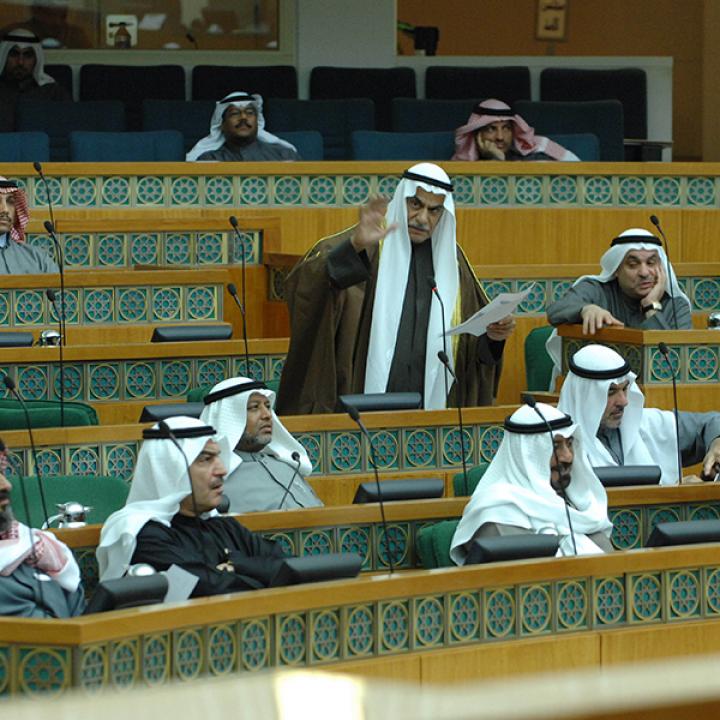
- Policy Analysis
- Fikra Forum
What Does the Dissolution of the Kuwaiti Parliament Mean for the Next Election?

Kuwaiti citizens are fed-up with the highly unproductive and unrepresentative 2013-parliament of both opposition and tribal groups. Thus the turnout for the upcoming elections is expected to be high with both political groups vying to make a comeback.
On a quiet Sunday morning, the emir, Sheikh Sabah Ahmad al-Jaber al-Sabah, dissolved the largely pro-government parliament after an emergency cabinet meeting. This was not unusual: Kuwait’s parliamentary elections have shown a consistent pattern of dissolution by the emir. From 1975 until 2016, ten parliaments were dissolved by the emir’s decree. According to article 107 of the Constitution, “The emir has the right to dissolve the parliament by a decree that shows the reasons for this dissolution. And if the parliament was dissolved, new elections for a new parliament should be held within no longer than a two month period from the date of dissolution.” The upcoming elections are scheduled for November 26th, 2016, but why was the parliament dissolved in the first place?
The reason(s) for the dissolution of the most recent parliament–established in 2013–were vaguely stated in an official decree document published in the Seef palace and signed by the emir. The document claimed that this decision was motivated by “volatile regional developments and mounting security concerns.” While it is true that, before its dissolution, the parliament raised concerns about internal security, regional developments were not on the agenda. The internal security of Kuwait was shaken to the core by the suicide bombing of a Shia mosque in 2015, which was carried out by a Saudi national who was a member of the Islamic State. But, in response to the attack, Kuwait’s National Assembly created a counter-terrorism law with a clause requiring that all Kuwaiti citizens, expats, and visitors provide their DNA samples to authorities. Consequently, the parliament and The Islamic Constitutional Movement reeled at this new precedent, deeming the law as ‘unconstitutional’ and in violation of the human rights agreements that Kuwait has agreed to uphold.
But most likely, the dissolution stemmed from development within the economy. The unpopular and widely criticized petroleum subsidy cuts proposed by Anas Al-Saleh, the Finance and acting Oil Minister, has unsurprisingly agitated both parliament members and fellow citizens alike. This agitation was translated into a joint proposal written by several parliament members to lambast the finance minister.
Similarly, several other parliament members have filed requests to shine the spotlight on the Justice and Islamic Affairs Minister, Yaqoub Al-Sana’a, on the grounds of exploiting the financial resources of the ministry. Both ministers are deemed as pro-government, as they were selected by the cabinet to represent the government’s views and aspirations. Attempts to grill government loyalists place the government in a vulnerable position. The government’s fear of escalating tensions in parliament led them to consult with the emir and utilize the commonly used shortcut of parliament dissolution. In doing so, they are actively avoiding confrontation over both the DNA law and the petroleum subsidy cuts.
Some speculators argued that the government had intentionally attempted to schedule early elections to prevent the high-profile opposition figure, Musllam Al-Barrak, from running. While the elections were originally planned for July 2017, Al-Barrak is currently imprisoned on charges of verbally insulting the emir and would be released in 2017. Although it would be legally permissible if Al-Barrak runs as a candidate while in prison, he has not announced his intention to run. Al-Barrak is a key member of the Popular Action Movement, known as “Hashd”, which is one of the most vocal and largely influential political opposition groups in Kuwait. Hashd have announced its intention to boycott this elections cycle, making it the third election they have boycotted due to their disagreement on the controversial “one man one vote law” enacted in 2012.
With the exception of Hashd, all major political groups have announced their intention to run, including several other opposition groups. For example, the Islamic Constitutional Movement, representing the Kuwaiti branch of the Muslim Brotherhood, announced its intention to take part in the next elections. The same is true for Salafists, and liberal factions. The Shia’s have consistently been keen allies of the Al-Sabahs, and have never boycotted elections before. As expected, many of these factions will be running in this upcoming election.
Tribal groups, on the other hand, have had issues with the government in the previous elections. They had boycotted the 2012 and 2013 elections alongside opposition groups over the “one man one vote law.” In contrast to Hashd, the tribal groups’ frustration of being unrepresented has inspired a break in their boycott cycle, now holding primaries and sorting their candidates for the upcoming elections. While holding primaries is illegal under Kuwaiti law, for many years tribes have successfully managed to cooperate between one another and select their representative candidates who would eventually get elected.
Ultimately, Kuwaiti citizens are fed-up with the highly unproductive and unrepresentative 2013-parliament of both opposition and tribal groups. Thus the turnout for the upcoming elections is expected to be high with both political groups vying to make a comeback. This explains why the final count for candidates running for the 2016 elections has been recorded to be the highest in Kuwait’s history, with 454 candidates running for parliament. There is an appetite for parliamentary change among the Kuwaiti public and the next few weeks will reveal as much.


